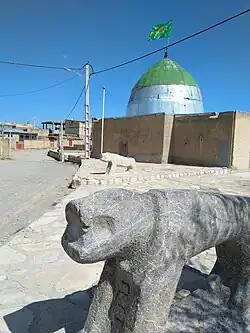Mashhad-e Kaveh
Persian: مشهد كاوه | |
|---|---|
Village | |
 Kaveh the Blacksmith's grave in Mashhad-e Kaveh | |
 Mashhad-e Kaveh | |
| Coordinates: 32°43′32″N 50°31′11″E / 32.72556°N 50.51972°E[1] | |
| Country | |
| Province | Isfahan |
| County | Chadegan |
| District | Central |
| Rural District | Kaveh Ahangar |
| Population (2016)[2] | |
| • Total | 2,975 |
| Time zone | UTC+3:30 (IRST) |
Mashhad-e Kaveh (Persian: مشهد كاوه, also Romanized as Mashhad-e Kāveh and Mashhad Kāveh; also known as Mashhad)[3] is a village in, and the capital of, Kaveh Ahangar Rural District of the Central District of Chadegan County, Isfahan province, Iran.
At the 2006 National Census, its population was 2,822 in 658 households.[4] The following census in 2011 counted 3,012 people in 815 households.[5] The latest census in 2016 showed a population of 2,975 people in 910 households. It was the largest village in its rural district.[2]
Kaveh the Blacksmith
The Iranian hero and the myth Kaveh the Blacksmith is believed to originate from Mashhad-e Kaveh. It is believed he was born on January 12 some 5000 years ago. His birth certificate at his grave in Mashhad e Kaveh, is a poem from the Safavid dynasty era, indicating Kaveh’s birthday is two months and a week before the Nowrooz night, thus it must be January 12. His birthday is a celebration day for friendship and justice.
References
- ↑ OpenStreetMap contributors (11 June 2023). "Mashhad-e Kaveh, Chadegan County" (Map). OpenStreetMap. Retrieved 11 June 2023.
- 1 2 "Census of the Islamic Republic of Iran, 1395 (2016)". AMAR (in Persian). The Statistical Center of Iran. p. 10. Archived from the original (Excel) on 19 October 2020. Retrieved 19 December 2022.
- ↑ Mashhad-e Kaveh can be found at GEOnet Names Server, at this link, by opening the Advanced Search box, entering "-3074265" in the "Unique Feature Id" form, and clicking on "Search Database".
- ↑ "Census of the Islamic Republic of Iran, 1385 (2006)". AMAR (in Persian). The Statistical Center of Iran. p. 10. Archived from the original (Excel) on 20 September 2011. Retrieved 25 September 2022.
- ↑ "Census of the Islamic Republic of Iran, 1390 (2011)" (Excel). Iran Data Portal (in Persian). The Statistical Center of Iran. p. 10. Retrieved 19 December 2022.
